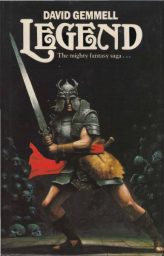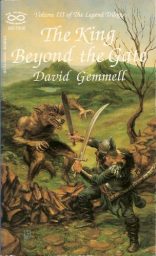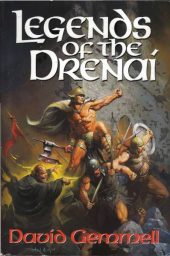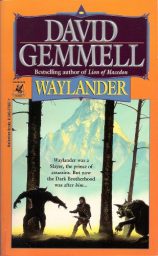 There was a time between the collapse of sword and sorcery publishing in 1985 and before George R. R. Martin’s A Game of Thrones came out. In that
There was a time between the collapse of sword and sorcery publishing in 1985 and before George R. R. Martin’s A Game of Thrones came out. In that  time, David Gemmell (1948-2006) almost kept sword and sorcery alive single-handed.
time, David Gemmell (1948-2006) almost kept sword and sorcery alive single-handed.
We lost David Gemmell ten years ago on July 28, 2006 from complications after heart surgery. This was a blow to the sword and sorcery field. Fortunately for us, he produced a steady and large number of novels from 1984 until his death.
David Gemmell wrote his first novel Legend during a cancer scare where he thought he was staring at death. Legend is one of the ultimate siege novels of all time. The novel introduced Druss the Axeman. The name Druss is a variation on the Celtic name Drust/Drustan/Tristan. There were some Pictish kings with the name Drust in the early Middle Ages. You can’t go wrong with bad-ass warrior with a Celtic name.
Legend is set in Gemmell’s imaginary world of the Drenai. Dale Rippke’s old Dark Storm website had the world of the Drenai set thousands of year in the future. Obviously, our civilization has collapsed and a medieval level society and technology has emerged with no knowledge of the past. Supernatural elements are also present.
Legend is a life and death struggle with a horde of eastern Mongol types on the march and primed to invade the Drenai. This is a novel about heroism in the face of hopeless odds with some meditations on mortality. Read this book as an antidote to George R. R. Martin.
David Gemmell’s novels are anti-nihilist. There are great warriors but many characters are somewhat ordinary people put into extraordinary circumstances.
Gemmell was not published in the U.S. until 1988 when Legend was renamed Against the Horde by New Infinities. King Beyond the Gate and Waylander were also released and almost forgotten. The covers were generic and looked more like some gaming tie-in than sword and sorcery.
Del Rey/Ballantine would start reprinting David Gemmell in late 1994. I saw the books but did not pick them up for over a year. Del Rey published Terry Brooks, David Eddings, and Piers Anthony, not sword and sorcery, so I passed on them. The Luis Royo covers did not help. It was the late Steve Tompkins who told me about David Gemmell and urged me to give  him a try.
him a try.
I picked up The King Beyond the Gate in early 1996 and was hooked. I picked up Waylander and Quest for Lost Heroes for a week long vacation in the Bahamas which I read beside the pool.
I read David Gemmell constantly in 1996 getting caught up with his back catalog. Steve Tompkins would fly to London on three day weekends. He would sleep on padded benches in alcoves at Heathrow Airport and sally forth to London bookstores. He would return with suitcases filled with books. I would get David Gemmell books years before the U.S. release.
I was also fortunate in having a Jute in Kent who got me some Gemmell hardbacks with inscriptions to me at book signing events. When asked about his opinion on Robert E. Howard, Gemmell replied “Brilliant stuff.” Gemmell was also a big Louis L’amour fan.
Steve and I would discuss how David Gemmell was keeping sword and sorcery fiction alive. Granted, it wasn’t in the classic pulp novelette form but it was filled with sorcery, battles, villains, and heroes. Some of Gemmell’s later novels were filled with some domestic family relationship dialog and scenes, which I could have done without. That was the nature of publishing of the time. Gemmell was still the model of efficiency in comparison to most other fantasy fiction published at the time.
I generally recommend Morningstar as a good novel to start with. It is relatively short and a very typical Gemmell novel. If you don’t like him, you can move on, you have not invested too much into him. Knights of Dark Renown is another good starter novel.
Some consider both Morningstar and Knights of Dark Renown to be in the same world as the Drenai but set much earlier before. In fact, one could probably arrange all of Gemmell’s novels into one long sequence extending eons into the future.
I am not a big fan of the three Jon Shannow novels. They are post-apocalyptic novels with Jon Shannow owing something to the Man with No Name and Louis L’amour. I am not a big fan of post-apocalyptic novels in general though I should give them another try.

Unfortunately, David Gemmell did not produce much in the way of fiction in shorter lengths. He wrote a Druss origin story for a Drenai omnibus. He then went on to write a collection of novellas/short novels, The First Chronicles of Druss the Legend. Gemmell hinted at a second chronicles but time ran out. This is another good place to start with David Gemmell. Druss acquires the demon axe, Snaga the Sender in the first novella. Foreign raiders takes his wife who eventually ends up in the harem of a foreign potentate. Gemmell does not take the easy way out, the potentate is a decent guy and hard decisions are made.
“Druss the Legend” has him at a Battle of Thermopylae situation. It goes to show the paucity of sword and sorcery in magazine form at this time that Gemmell had no market for shorter fiction. Some excerpts appeared in Amazing Stories and a Del Rey sampler paperback (probably handed out at conventions).
Reading David Gemmell got me through a difficult period of my life. If you like sword and sorcery, have exhausted the older stuff, give him a try. He stands beside Robert E. Howard, Clark Ashton Smith, Michael Moorcock, and Karl Edward Wagner in my personal opinion. You will feel pretty good upon finishing one of his novels and not icky unlike some others popular these days. Gemmel died on July 28. His birthday was August 1st. I will be raising a glass in remembrance.

Its surely not inconsequential either that he lived in Hastings, in a landscape – quite literally – saturated with the blood of heroes, from Anglo-Saxon housecarles to Spitfire pilots, and awash with tales of mythic defensive battles. (Its surely no coincidence that his first and greatest hero should be an axeman).
A fine tribute to a magnificent storyteller. I couldn’t agree with your estimation more. Although other fine writers like Paul Kearney and Angus Wells were later to make their own significant contributions there was a time when Gemmell really was a solitary torchbearer for the genre.
His books are standing the test of time, and if people aren’t still reading them in a hundred years then it will be a sad reflection on future generation’s appetite for adventure.
I was privileged to have a good conversation with him at the World Fantasy Convention in Corpus Christi. A wonderful writer and a really nice guy. He’s certainly missed. I seem to remember reading that Druss was based to a certain extent on his stepfather.
I have 5 or 6 of Gemmell’s novels on my shelf, yet I have not read any. I do not know why. I have always felt S&S was best served as a short story or novella. Maybe I need to try something different. I think I shall…
Cro-Magnon; I am curious about Angus Wells. The same fellow who co-wrote the Raven series of S&S novels? What other S&S did write? Might have to check his stuff out.
-
Hello Stan; yes that’s right, Angus Wells did indeed co-author the Raven series with Robert Holdstock. Much of his career was spent similarly anonymously churning out westerns under a variety of pen names. Then at the end of the 80s – and probably motivated by Gemmell’s escalating sales – he suddenly began producing increasingly hefty fantasy novels under his own name. And proved to have a real knack for them too(imho).
His first effort was an excellent trilogy whose umbrella title was The Book of the Kingdoms. This was about a magnificently malign creature called Taws, the servitor of a dark god, and his efforts to destroy the titular kingdoms both by force and subterfuge. The first volume, THE WRATH OF ASHUR, culminates in a vividly imagined siege of High Fort which might have come straight out of the Gemmell fantasy manual.
Wells followed this up with the even more audacious Godwars series – three volumes weighing in at 500+ pages each. Then came the two book Exiles sequence.
By some strange quirk of Fate Gemmell and Wells experienced contrasting fortunes with their domestic and Stateside audiences. Wells’ work seemed to go down better in the US and his later standalone novels like THE GUARDIAN were Bantam Spectra issues only with no corresponding UK edition.
By a tragic irony this year also marks the tenth anniversary of the death of Angus Wells. He predeceased Gemmell by a couple of months having been killed in a fire at his flat.
A tragic loss.Do check his books out. They’re greatly underappreciated in my opinion.
-
Thanks for the info, Cro-Magnon Man! I was aware of Wells’ prolific pulp output, but I have never seen his fantasy works. I will try to find some to sample!
-
The pleasure’s all mine Stan.
If it helps any the individual titles of the series books are as follows:The Book of the Kingdoms: WRATH OF ASHAR, THE USURPER & THE WAY BENEATH
The Godwars: FORBIDDEN MAGIC, DARK MAGIC & WILD MAGIC
Exiles: EXILE’S CHILDREN & EXILE’S CHALLENGE
He also produced the standalone novels LORDS OF THE SKY, THE GUARDIAN & YESTERDAY’S KINGS
-
I’ve read and enjoyed some of Wells’ Westerns. I need to try his fantasies.
-
-
-
I doesn’t feel that long ago that Dave died. Like you I got all the books he had published in the UK long before they were in thew USA. Plus they were all signed! It was his thank you for all the work I had done on the Drenai section of my Dark Storm website. Big plus was that he got me $500 out of Random House for the use of my map. He told me that I should be compensated for all the time I spent researching it. I miss Dave.
I’ve only read Legend, and I wholeheartedly agree it’s as bloody and exciting a novel as you write. I don’t know why I haven’t read more. I’m glad to read him described as an anti-nihilist. This clearly sprung from his Christianity. I pretty bored with the books that make me feel “icky.” I need to get back on the S&S horse this fall, and you make him sound like exactly what I need.
I’m only a quarter of the way into Morning Star and it’s already amazing. Thanks so much, Morgan.
-
What the hell happens at the 3/4 mark? Did somebody else finish it?
-
The book has been very good, then it suddenly turns to shit with this:
‘Don’t ask me why, Mace,’ said Wulf, ‘but I get the feeling he doesn’t like you.’
-
WTF?
‘And I you,’ came her voice in my mind. ‘But let us face it, Owen, I am a better fighter than you. At least with me there, you’ll have someone to protect you.’
I got hooked on David Gemmel by way of the John Shannow novels. I liked every thing I read of his after that.
Gemmell wrote books for and about Men.
Thanks for this. This is exactly what I’m looking for.
I started reading Gemmell about three years ago. At the time I was astonished that I had not heard of him before and then I found out he had already passed away some years ago. He is now one of my favorite authors and I’m working my way through his oeuvre.
It’s funny, when I look back at the authors I read growing up and enjoyed as a young man (and still enjoy), I realize how like-minded certain authors and their readers are. For instance, I love L’Amour and Howard. My dad introduced me to them and also Burroughs and Wagner and a host of other authors, and to hear that Gemmell held a high opinion of them just reaffirms my fondness for the man, his stories, and his voice.
Thanks for this fantastic post and for appreciating Gemmell. I rarely find books these days with the same caliber storytelling.
I am sort of surprised to see Clark Ashton Smith mentioned among sword and sorcery writers. Maybe it is because I have read few stories of his, but those which I have resembled much more Lovecraft’s stories than Howard’s.